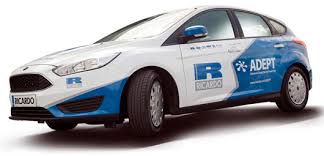
Ricardo is pursuing research that aims to reduce the development cycle time of hybrid vehicles through the use of simulation for the simultaneous optimization of mechanical, thermal and electrical energy efficiency.
The electrification of new passenger cars based on 48V powertrain architectures is being viewed with increasing enthusiasm by automakers as they seek to offer affordable, highly fuel-efficient and clean products with the potential to achieve rapid market penetration. Engineered correctly, such powertrain architectures have the potential to deliver both environmental and performance goals – particularly in the higher-volume, mid-market vehicle segments. If successful, the research being undertaken by Ricardo will mean that such hybrid vehicle projects can be delivered up to 15 percent sooner and at lower cost. Importantly, the methods devised can improve both the vehicle emissions and performance in real-world driving conditions.
The work is being carried out by Ricardo as part of the THOMSON European research project, which is developing cost-effective solutions of 48V mild-hybrid vehicles to replace conventionally engined cars. Ricardo is combining the strengths of its electrification product development process, known as R-Intelect, and its Integrated Model Based Development (IMBD) environment, for the simulation-led development and engineering of all types of powertrains. The IMBD environment is being extended to allow system level thermal management and engine calibration to be optimized, which should provide savings in the powertrain development time.
“One of our key aims within the THOMSON project is to deliver an integrated hybrid vehicle powertrain toolchain,” explains Steve Sapsford, director of business strategy, Ricardo. “This will enable optimization of energy usage, and engine and aftertreatment calibration over a range of drive-cycles. As well as ensuring that environmental targets are met, this process delivers a highly efficient powertrain that meets customer expectations for performance and affordability.”
Work on the THOMSON project is ongoing, with Ricardo and their partners expecting to publish the final results in the Autumn of 2020.









More Stories
Towing Services Explained: 6 Key Facts You Need to Know
Environmental Factors That Influence Ceramic Coating Choices
Professional vs. DIY Tinting: What You Should Know